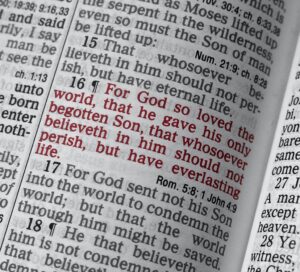Good is one of my treasured words*. We use it multiple times every day because it is so versatile. This is just a partial list of Merriam-Webster definitions: bountiful, attractive, suitable, pleasant, clever, well-founded, honorable, adequate, kind, competent, loyal. However, the word is as subjective as it is useful. Whether or not an idea is good (clever), an essay is good (adequate), or an aroma is good (pleasant) depends on our personal preferences. This nondefinitive use of good is not the one that makes my heart leap.

Good has some nobler and more precise items in its portfolio. One is having the honor of being the descriptor of the day we remember the death of Jesus at Calvary. Around 1300, the Friday before Easter came to be called Good Friday. The meaning of good then was “holy, sacred” (Online Etymology Dictionary). Good Friday is considered good, or sacred, because it led to Jesus’s resurrection and his triumph over sin and death.

Good describes the Bible as “the Good Book.” The first clear evidence of the phrase was in 1801 in missionary literature regarding efforts to spread the gospel to American Indian tribes (Online Etymology Dictionary).
I have read scores of good books over my lifetime, but there will always be only one Good Book. The Bible came from God himself to declare his love to us and provide all we need to live the life he created us for. “16All Scripture is God-breathed and is useful for teaching, rebuking, correcting and training in righteousness, 17so that the man of God may be thoroughly equipped for every good work” (2 Timothy 3:16-17). Each and every Scripture is good because it was divinely inspired by God.
Good is found within our everyday word good-bye. Partings can often bring sadness and tears and feel anything but good, yet we still use the common good-bye. This word and its variations (goodbye, good bye, good-by) date back to the 1590s. It evolved from the word godbwye from the 1570s. That word was actually a contraction of the parting phrase God be with ye from the late 14th century.
It’s sad to me that, in streamlining our speech, we have lost the original meaning and purpose of this much-used word. Even if we happen to know its illustrious beginnings, we say it automatically without remembering its origin as a gracious blessing spoken over those leaving our presence.
Besides its connection to a sacred day, a holy book, and a farewell blessing, good describes the character of Jesus. In fact, he said he is the only one who is good. “17As Jesus started on his way, a man ran up to him and fell on his knees before him. ‘Good teacher,’ he asked, ‘what must I do to inherit eternal life?’ 18‘Why do you call me good?’ Jesus answered. ‘No one is good—except God alone’” (Mark 10:17-18; also Matthew 19:16-17 and Luke 18:18-19).
Jewish rabbis would not allow anyone to refer to them as good; that word was reserved for only God. So when the man addressed Jesus as the “good teacher,” Jesus questioned him to see if he understood that in talking with Jesus he was talking to God.
The Greek word used here for good is agathos. It means “intrinsically good, good in nature, good whether it be seen to be so or not” (Strong’s Concordance). God’s nature is good. Goodness is inherent in him and cannot be separated from him. Regardless of whether or not we recognize his goodness, he is, and always will be, good.

When agathos refers “to the believer [it] describes what originates from God and is empowered by Him in their life, through faith” (HELPS Word-studies). The only good in our world originates from God. After he created the world in six days, he “saw all that he had made, and it was very good” (Genesis 1:31). It was good because it was spoken into existence by the fountainhead of all goodness.
We have already read that no one is good but God. Since the first sin in the Garden of Eden, mankind is born into this world having no inherent goodness. The only goodness people have is what comes to them from our good God. “Every good and perfect gift is from above, coming down from the Father of the heavenly lights, who does not change like shifting shadows” (James 1:17).

Jesus wants us to recognize his goodness, so he gave us a visual. He said, “I am the good shepherd. The good shepherd lays down his life for the sheep” (John 10:11). The Greek word used here is kalos. It is distinguished from agathos in that it refers to “an outward sign of the inward good” (Strong’s). Jesus is showing us what his goodness looks like: A shepherd would care for his sheep by guiding them to safe pastures, providing food and water, tending the wounded, nursing the sick, searching for the lost. And he would protect his flock against any danger with his life.
Thayer’s Greek Lexicon gives a variety of nuances for agathos that also help us picture God’s goodness: useful, excellent, distinguished, upright, honorable, benevolent, kind, generous. David Jeremiah zeroes in on that last one. He said, “God’s goodness conveys His generosity. His goodness means far more than His generosity, but it certainly includes His infinitely generous attitude toward us.” [1]

In the parable of the vineyard workers, Jesus told of five groups of laborers who were hired on at different times throughout the day. The group that began in the morning was the only one that had agreed on their pay, a denarius; the others were told by the landowner (who represents God in this story) they would be paid what was right. At the end of the day, the men who had worked only an hour were each paid a denarius. When the early workers were also paid a denarius, they complained. “13But he answered one of them, ‘Friend, I am not being unfair to you. Didn’t you agree to work for a denarius? 14Take your pay and go. I want to give the man who was hired last the same as I gave you. 15Don’t I have the right to do what I want with my own money? Or are you envious because I am generous?’” (Matthew 20:13-15).

The word translated generous is agathos, our word for good. Many translations read good in this verse. Its meaning here is “in a narrower sense, benevolent, kind, generous” (Thayer’s). When I read that, I picture a funnel that God pours all of his aspects of goodness into. When they all mix together and press out through the small opening at the bottom into our lives, they collectively look a whole lot like generosity.

God is the preeminent giver. He gives us grace (Proverbs 3:34), peace (John 14:27), hope (Jeremiah 29:11), wisdom (James 1:5), forgiveness (1 John 1:9), faith (Ephesians 2:8), his only Son, Jesus (John 3:16), the Holy Spirit (Acts 2:38), a way to escape temptation (1 Corinthians 10:13), eternal life (Romans 6:23), the desires of our heart (Psalm 37:4), the right to become his children (John 1:12), everything we need (Philippians 4:19). And that’s the short list. Remember all the care, provision, and protection he gives as our shepherd? Everything he does is giving of himself for us. It is total selflessness. Because he is generous. Because he is good.
Good may seem like a small and ordinary word, but to me it is bursting open and overflowing with riches.
Good is
- the Word of God that reveals himself to his creation
- the perfect selflessness of God
- the consistent and continuous generosity of God toward me
- who God is
This is why good is a word in my treasure chest.

Feature photo by dominik hofbauer on Unsplash
*Treasured Words are words that have special value to me. Hearing them causes brilliant light and comforting warmth to radiate from a place deep inside me and fill my soul with a sense of well-being.
[1] 23 Verses About the Goodness of God
Scripture quotations are from NIV.
Greek definitions are from Bible Hub. See Resources.





marilyn hempfling
March 21, 2023Bonnie,
I found this article to be very insightful and informative. I learned somethings about that word “good” that were new to me. Thank you for this word study. More please! LOL!
Marilyn
bspencer
March 21, 2023Thank you so much, Marilyn. I learned things myself. I’m glad you found it informative.
Angie Camp
March 21, 2023LOVE the quote from Martin Luther, so I put it in my box of memory verses! The Good God be with you Bonnie, Angie
bspencer
March 21, 2023I love it! Thank you, Angie. God be with you, also.
Brenda+Murphy
March 22, 2023How interesting! My “wow” moment was about how only God is “good.” I get a kick out of a whole conversation I have with my mom using only the word “good.” We’ll be eating and I’ll ask, “Good?” (How is it?) “Good,” she’ll say (I like it). “Good,” I respond (satisfied). 🙂
bspencer
March 22, 2023Yes, only God… I just had this thought: If anyone else had inherent goodness, meaning there was another source, God would have legitimate competition for our devotion. As it is, His competition is just evil (not of God) masquerading as good.
I love your meal talk! Sounds like inspiration for a comedy sketch. Thanks, Brenda.